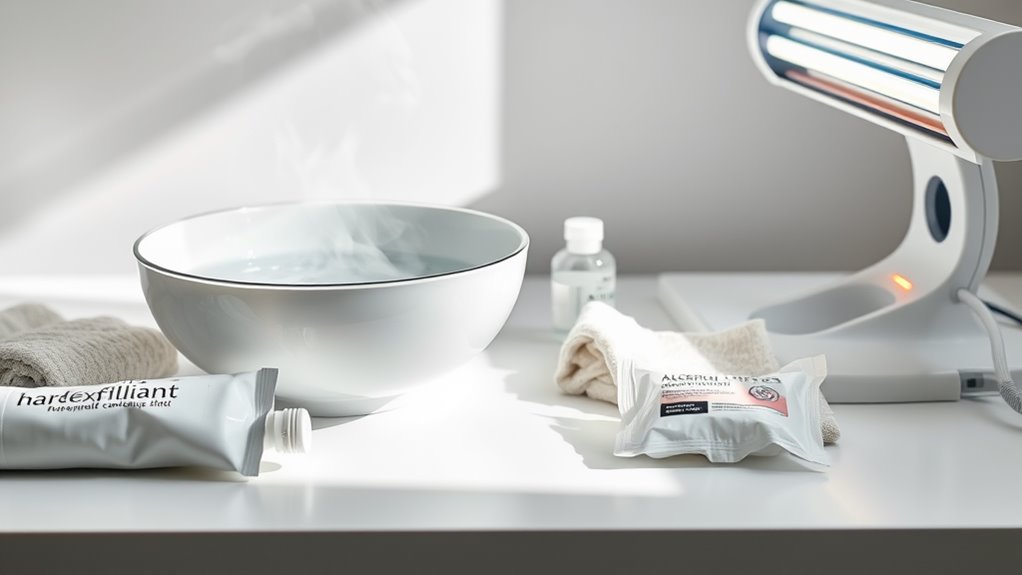5 Things You Should Never Do If You Have Sensitive Skin
If you have sensitive skin, don’t use harsh cleansers that strip your protective barrier and cause irritation. Avoid over-exfoliating, as it disrupts your natural oils and leads to dryness. Steer clear of hot water, which worsens sensitivity by removing essential moisture. Never skip sunscreen, opting for mineral-based SPF to shield against UV damage. And stop touching your face to prevent bacteria-induced breakouts. Adopting these practices will uncover even more ways to nurture your skin’s health.
Key Takeaways
- Avoid using harsh cleansers, as they strip away your skin’s natural barrier and cause irritation.
- Don’t over-exfoliate your skin, as it disrupts the protective barrier and leads to dryness.
- Steer clear of hot water, which strips natural oils and worsens sensitivity.
- Never skip sunscreen, as it protects against UV damage and prevents irritation.
- Avoid touching your face frequently, as it introduces bacteria and triggers breakouts.
Avoid Using Harsh Cleansers
Because harsh cleansers can strip away your skin’s natural barrier, you’ll want to avoid them to prevent irritation and flare-ups. These products often contain aggressive ingredients like sulfates and alcohol, which disrupt your skin’s protective layer and exacerbate sensitivity.
Instead, focus on soothing routines that prioritize gentle, non-stripping cleansers to maintain balance. You’ll benefit from selecting formulas with calming agents such as ceramides or hyaluronic acid, which preserve moisture and reduce redness.
Establish a daily routine by using lukewarm water and soft application methods, ensuring you cleanse without over-drying. This approach strengthens your skin’s resilience, minimizing discomfort and supporting overall health. Additionally, exploring soothing techniques can provide further relief for redness and sensitive skin.
Embracing soothing routines as part of your daily care is key to maintaining skin health and comfort.
Don’t Over-Exfoliate Your Skin
Exfoliating too often disrupts your skin’s protective barrier, leading to increased irritation and sensitivity. This strips away natural oils, heightening vulnerability to dryness and inflammation, which you can avoid by sticking to a gentle routine. You’ll exacerbate issues like redness or breakouts if you ignore your skin’s limits, so aim for moderation to preserve its balance. By following actionable tips in your skincare routine, you can further protect your skin from common pitfalls.
Onewashing can similarly impact moisture balance and increase breakout triggers, emphasizing the need for a balanced skincare approach.
To guide you effectively, here’s a breakdown of exfoliation practices:
| Frequency | Risks | Alternatives |
|---|---|---|
| Daily | Severe irritation | Mild cleansers |
| 2-3 times/week | Increased sensitivity | Hydrating serums |
| Once a week | Minimal disruption | Soothing masks |
Steer Clear of Hot Water
Hot water may feel comforting, but it strips your skin’s natural oils, worsening sensitivity and causing dryness or inflammation. You disrupt the skin’s protective barrier, making it more prone to irritation and potential infections.
Instead, opt for lukewarm water during showers or baths; it cleanses effectively without the harsh effects. You’ll notice less redness and tightness if you limit exposure to under 10 minutes.
Always pat your skin dry gently rather than rubbing, as this preserves moisture. Remember, consistent habits like these maintain your skin’s balance and reduce flare-ups.
Never Skip Sunscreen
Just as you’ve learned to avoid hot water’s drying effects, you can’t overlook sunscreen’s role in shielding sensitive skin from UV damage.
UV rays can inflame and weaken your skin’s barrier, leading to burns, hyperpigmentation, and increased sensitivity. Make sunscreen a daily essential to maintain your skin’s health and prevent long-term issues. By incorporating these habits, you can avoid common morning skincare mistakes for radiant skin.
-
Apply broad-spectrum SPF 30+ daily: This blocks UVA and UVB rays, reducing inflammation and flare-ups on sensitive skin.
-
Choose mineral-based formulas****: Zinc oxide or titanium dioxide options are less irritating and provide a physical barrier against UV exposure.
-
Reapply every two hours: Especially outdoors, this ensures continuous protection, minimizing risks of damage and maintaining skin integrity.
Additionally, for maximum effectiveness, focus on application techniques to properly apply sunscreen and enhance its protective benefits.
Avoid Touching Your Face Frequently
While you mightn’t realize it, touching your face frequently introduces bacteria, oils, and irritants that can irritate sensitive skin, leading to breakouts, inflammation, and heightened sensitivity.
You’re constantly transferring germs from your hands, which pick up environmental pollutants and residues throughout the day. This disrupts your skin’s barrier, worsening conditions like eczema or rosacea and making your skin more reactive.
To combat this, wash your hands regularly with a gentle, fragrance-free soap and keep them occupied with activities like fidget tools. If stress prompts the habit, practice mindfulness or deep breathing exercises. Additionally, adopting holistic strategies can help reduce stress and promote better skin resilience.
Moreover, ceasing this habit can lead to transformative effects on your skin health, as supported by scientific insights and personal experiences.

